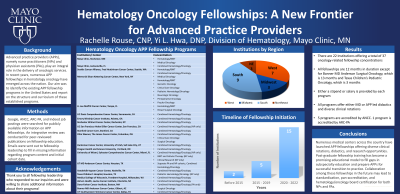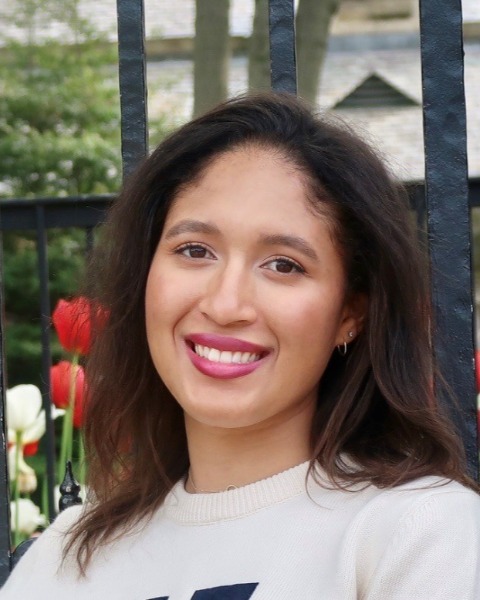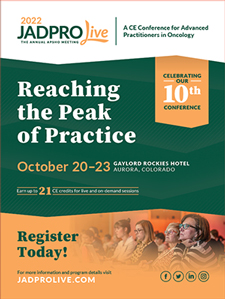Back


Clinical Posters
JL1014C: Hematology Oncology Fellowships: A New Frontier for Advanced Practice Providers
Saturday, October 22, 2022
10:00 AM – 11:00 AM ET

Has Audio

Rachelle Rouse, CNP (she/her/hers)
Benign Hematology Nurse Practitioner, Core Consultative Hematology Group
Mayo Clinic Rochester
Rochester, Minnesota, United States
Poster Presenter(s)
BACKGROUND
Advanced practice providers (APPs), namely nurse practitioners (NPs) and physician assistants (PAs), play an integral role in the delivery of oncologic services. In recent years, numerous APP fellowships in hematology oncology have emerged across the nation. The aim of this study was to identify the existing APP fellowship programs in the United States and report on the structure and curriculum of these established programs for interested learners.
METHODS
The electronic databases of Google were searched for the information from fellowship websites and Indeed job postings. An integrative systemic review was conducted for peer-reviewed publications on fellowship education in PubMed, Medline and CINAHL. Emails were sent out to fellowship leadership to fill in missing information regarding program content and initial cohort date.
RESULTS
A total of 22 institutions across 14 states were identified offering 34 fellowship concentrations from the following categories: hematology and stem cell transplant (4), solid tumor (2), combined hematology and oncology (17), surgical oncology (4), pediatric oncology (2), geriatric oncology (1), critical care oncology (2), neurology/neurosurgical oncology (1), and psychiatry oncology (1). 5 fellowships accept only NPs, and 2 fellowships accept only PAs. The duration of most fellowships is 12 months except for 2 programs, one of which is 3 months, and the other is 13 months. Either a stipend or salary is provided by each program. All programs offer didactic curriculum and various specialty-focused clinical rotations. There were only 5 institutions offering APP fellowships before 2018. The vast majority of programs were launched within the past 3 years.
CONCLUSIONS
Numerous medical centers across the country have launched fellowships offering diverse clinical rotations, didactics, and research opportunities to train the next generation of APP leaders in cancer care.
RECOMMENDATIONS
The increasing complexity of oncology practice, coupled with an aging physician workforce and patient population, has placed tremendous demand on existing cancer care infrastructure. The traditional on-the-job training model has been insufficient for APPs new to oncology practice, with many APPs reporting that structured training would enhance their knowledge, clinical confidence, and job satisfaction. Post-graduate fellowship training has become a promising educational model to fill gaps in subspecialty education and prepare APPs for successful transition to practice. Collaboration among these fellowships in the future may lead to standardization, pan-accreditation, and hematology/oncology board certification for both NPs and PAs.
Advanced practice providers (APPs), namely nurse practitioners (NPs) and physician assistants (PAs), play an integral role in the delivery of oncologic services. In recent years, numerous APP fellowships in hematology oncology have emerged across the nation. The aim of this study was to identify the existing APP fellowship programs in the United States and report on the structure and curriculum of these established programs for interested learners.
METHODS
The electronic databases of Google were searched for the information from fellowship websites and Indeed job postings. An integrative systemic review was conducted for peer-reviewed publications on fellowship education in PubMed, Medline and CINAHL. Emails were sent out to fellowship leadership to fill in missing information regarding program content and initial cohort date.
RESULTS
A total of 22 institutions across 14 states were identified offering 34 fellowship concentrations from the following categories: hematology and stem cell transplant (4), solid tumor (2), combined hematology and oncology (17), surgical oncology (4), pediatric oncology (2), geriatric oncology (1), critical care oncology (2), neurology/neurosurgical oncology (1), and psychiatry oncology (1). 5 fellowships accept only NPs, and 2 fellowships accept only PAs. The duration of most fellowships is 12 months except for 2 programs, one of which is 3 months, and the other is 13 months. Either a stipend or salary is provided by each program. All programs offer didactic curriculum and various specialty-focused clinical rotations. There were only 5 institutions offering APP fellowships before 2018. The vast majority of programs were launched within the past 3 years.
CONCLUSIONS
Numerous medical centers across the country have launched fellowships offering diverse clinical rotations, didactics, and research opportunities to train the next generation of APP leaders in cancer care.
RECOMMENDATIONS
The increasing complexity of oncology practice, coupled with an aging physician workforce and patient population, has placed tremendous demand on existing cancer care infrastructure. The traditional on-the-job training model has been insufficient for APPs new to oncology practice, with many APPs reporting that structured training would enhance their knowledge, clinical confidence, and job satisfaction. Post-graduate fellowship training has become a promising educational model to fill gaps in subspecialty education and prepare APPs for successful transition to practice. Collaboration among these fellowships in the future may lead to standardization, pan-accreditation, and hematology/oncology board certification for both NPs and PAs.

